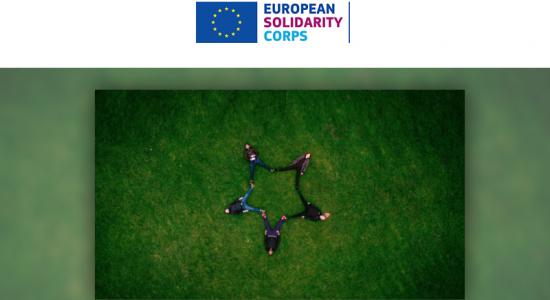
Solidarity projects
A Solidarity Project is a non-profit solidarity activity initiated, developed and implemented by young people themselves for a period from 2 to 12 months. It gives a group of minimum 5 young persons the chance to express solidarity by taking responsibility and committing themselves to bring positive change in their local community, although some of them can also tackle regional or even national issues.
Who can take part
A group of minimum 5 young people, aged between 18 and 30 years, who are legally residing in one in one and the same EU Member State or a third country associated to the Programme and have registered in the European Solidarity Corps Portal.
How does it work
Solidarity Projects should address key challenges within the communities but should also clearly present European added value.
Participation in a solidarity project is an important non-formal learning experience through which young people can enhance their personal, educational, social and civic development.
A solidarity project will typically consist of the following stages:
– Planning;
– Preparation;
– Implementation of the activities;
– Follow-up (including the evaluation of the activities as well as the dissemination of the project’s result).
The activities will take place in the country of residence of the participants.
In cases in which the project addresses cross-border challenges, project activities can also take place in cross-border regions of the EU Member States, third countries associated to the Programme and third countries non-associated to the Programme sharing the border with the country of the applicant.
One of the participants will assume the role of a legal representative who will be in charge of submitting the application (unless an organisation applies on behalf of the group).
Young people implementing Solidarity Projects should design accessible and inclusive activities, taking into account the needs of participants with fewer opportunities.
Special funding for the participation of young people with fewer opportunities is available both for the members of the group and the target group.
Solidarity Projects should promote environmentally sustainable and responsible behaviour among participants, raising awareness about the importance of acting to reduce or compensate for the environmental footprint of activities.
Organisation
A group of young people who plan a solidarity project can also seek support from an organisation which can be any public or private body.
An organisation may apply on their behalf for a grant under the European Solidarity Corps.
The role of the organisation should be mainly administrative, to support the group in the project life-cycle administrative and financial tasks. However, it can also offer support and guidance in identifying and documenting learning outcomes.
Coach
Young people carrying out a Solidarity Project may be supported by a coach, a volunteer or professional person, who could have youth work experience to accompany groups of young people and support their participation.
Funding
630 EUR per month.
Who can submit the application
The group that will implement the project. One of the young people in the group assumes the role of the legal representative and takes the responsibility of submitting the application.
Any public or private body on behalf of the group that will implement the project should submit the application to the National Agency of the country where the applicant is legally resident.
More instructions on how to submit the application at part E of the European Solidarity Corps guide.
Deadlines
– 20 February at 12:00 (midday Brussels time) for projects starting between 1st June and 31st December of the same year;
– (Optional round) 7 May at 12:00 (midday Brussels time) for projects starting between 1 August and 31 December of the same year;
– 1 October at 12:00 (midday Brussels time) for projects starting between 1st January and 31st May of the following year.
National Agencies may organise three selection rounds by setting three deadlines as above or only the first (20 February) and the last (1 October) one.
Please check the website of the National Agency in your country.
For further details, please check the European Solidarity Corps Guide.
